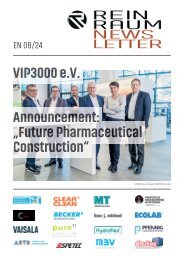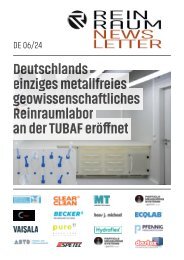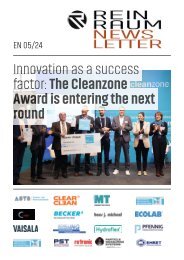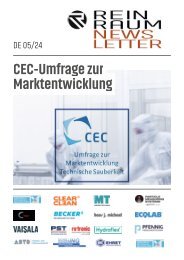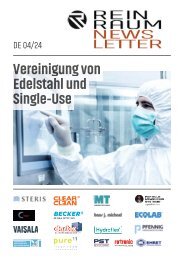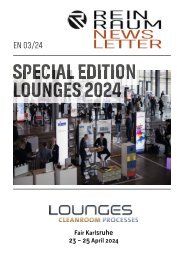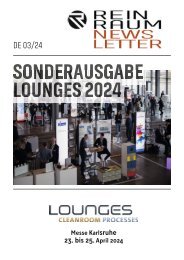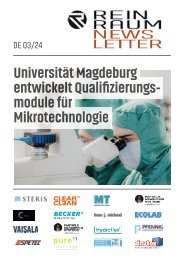Newsletter_03-2024_EN
In a quickly developing sector current information is especially important. On the one hand reinraum online offers interested persons the possibility to inform themselves comprehensively about current topics in the cleanroom branch. On the other hand companies and interested persons can use the platform to publish scientific reports, articles and company news. An event calendar complements the information offered. The ExpertPool helps with the advanced search: WHO is doing WHAT in cleanrooms. INTERNET:Current information is published daily/promptly on the internet on www.reinraum.de. NEWSLETTER: At the beginning of the month an interesting selection of the articles of last month is mailed as NEWSLETTER to all subscribers. NEWSFLASH: Between the monthly newsletters current information is sent via our NEWSFLASH to all subscribers. YEARBOOK: In January all selected articles of the last year are summarized in the CLEANROOM YEARBOOK.
In a quickly developing sector current information is especially important. On the one hand reinraum online offers interested persons the possibility to inform themselves comprehensively about current topics in the cleanroom branch. On the other hand companies and interested persons can use the platform to publish scientific reports, articles and company news.
An event calendar complements the information offered.
The ExpertPool helps with the advanced search: WHO is doing WHAT in cleanrooms.
INTERNET:Current information is published daily/promptly on the internet on www.reinraum.de.
NEWSLETTER: At the beginning of the month an interesting selection of the articles of last month is mailed as NEWSLETTER to all subscribers.
NEWSFLASH: Between the monthly newsletters current information is sent via our NEWSFLASH to all subscribers.
YEARBOOK: In January all selected articles of the last year are summarized in the CLEANROOM YEARBOOK.
Create successful ePaper yourself
Turn your PDF publications into a flip-book with our unique Google optimized e-Paper software.
In March <strong>2024</strong>, Anuga FoodTec will show how hygienic design and innovative<br />
technologies can contribute towards efficient cleaning and thus towards safer food.<br />
Anuga FoodTec <strong>2024</strong>:<br />
A guarantee for safe food<br />
Process hygiene is one of the most important themes at Anuga FoodTec <strong>2024</strong>. The linchpin of process hygiene is hygienic<br />
design, in other words the easy-to-clean design of parts and production systems. Food and beverage producers, who want<br />
to guarantee that their plant is the best from an „easy-to-clean“ point of view, will be able to find a multitude of solutions at<br />
the Cologne fair grounds - ranging from process instrumentation, to conveyor systems in washdown execution, through to<br />
fully-automatic CIP systems. The events and congresses scheduled to take place at the fair grounds in Cologne from 19 to 22<br />
March <strong>2024</strong> will also convey related know-how.<br />
The easy-to-clean design of parts and components is a key requirement<br />
in the hygiene-critical environment of food production. The<br />
theme in itself is nothing new. For almost 35 years the European<br />
machinery directive has demanded that a system is constructed in<br />
such a way that the materials that come into contact with food can<br />
be cleaned before every usage. This is primarily down to the machine<br />
builders and their technology partners, because whether it is a question<br />
of a pump, valve or flow meter: Changes to built-in components<br />
or the machinery itself are hardly possible at a later date and, if so,<br />
involve high costs.<br />
As such, hygienic design is at the top of the agenda for the companies<br />
exhibiting at Anuga FoodTec - but not only because it is a<br />
legal obligation. Namely, the cleanability has a major influence on<br />
the process safety. Even the slightest contaminations in the production<br />
and filling processes can lead to quality reductions or product<br />
recalls. The material itself is an important aspect of hygienic design.<br />
Process plants made of stainless steel dominate the scene in the<br />
food industry today. High-alloy steel with a roughness lower than 0.8<br />
micrometres is considered to be the ideal hygienic material, but does<br />
not guarantee easy cleanability on its own. Manufacturing an „old<br />
design“ from stainless steel doesn‘t help.<br />
Constructions without corners and edges<br />
A glance at the guidelines of the European Hygienic Equipment Design<br />
Group (EHEDG) makes it clear immediately: How clean a system<br />
really is after the cleaning process depends above all on the state<br />
of the surfaces that come into contact with products, the cleaning of<br />
which has to be carried out automatically. The most important design<br />
principles include the avoidance of horizontal surfaces, sharp<br />
edges and corners - because only if the cleaning process can be carried<br />
out residue-free, is it possible to rule out contaminations in food<br />
and cross-contaminations following a product change. In the case of<br />
closed processes like those typical for the beverage and milk industry,<br />
one should make sure that dead spaces, where microorganisms<br />
can accumulate, are avoided. The risk of contamination of the environment<br />
plays an important additional role in the case of the open<br />
processes of the meat and bakery industry.<br />
The materials that don‘t come into contact with products also<br />
have to be easy to clean and the surfaces should be smooth. For instance,<br />
a consistent seamless design and overhanging 30-degree<br />
angles with horizontal drip edges ensure that cleaning liquids drip<br />
off quickly and reliably. Beyond this a multitude of further constructive<br />
measures guarantee that the machines withstand high-pressure<br />
cleaning even at high temperatures and when using chemical cleaning<br />
agents. For instance for drives and control cabinets this means<br />
they have to comply with protection class IP69K.<br />
Automatic cleaning without dismantling<br />
The biggest challenge for the food manufacturers is coordinating<br />
the lines that produce in batch mode operation with the cleaning<br />
www.reinraum.de | www.cleanroom-online.com NEWSLETTER | Edition <strong>EN</strong> <strong>03</strong>-<strong>2024</strong><br />
page 26/33




